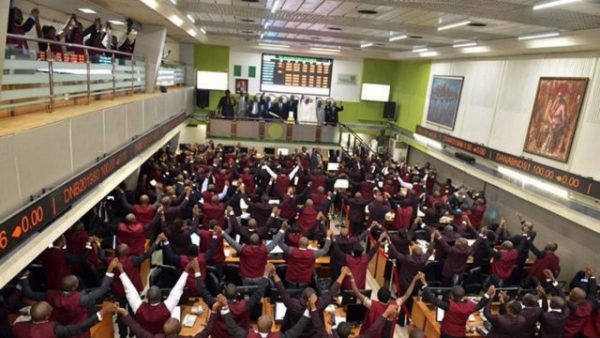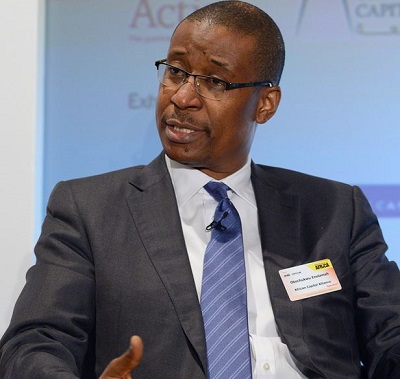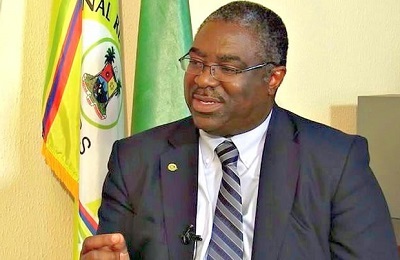Investors count losses as stock market wobbles under unending illiquidity, low confidence

Before the inauguration of President Muhammadu Buhari in the first term of his administration on May 29, 2015, the stock market had long lost some gains recorded during the boom period of 2003 to the global financial crisis of 2008. The crisis wiped off a staggering $1 trillion from the world economy.
In the aftermath of the crisis, equity capital formation started receding as financial assets took flight to safety in fixed-income securities.
The market enjoyed a decade- long boom and attained its highest growth in March 2008, with the All-share Index (ASI) of the Nigerian Stock Exchange (NSE) hitting 66,000 points with a value of daily transactions reaching over N12 billion. But it started declining and has currently suffered its worst bearish run since the inception.
Consequently, the Nigerian Stock Exchange (NSE), which grew steadily from N35.7 billion in the year 2000 to the highest point of N2.6 trillion in 2008, declined to a new low as of 2016.
The unprecedented lull triggered panic in the stock market within the period. The level of panic was such that it induced a spate of suicide among traders. Retail investors also suffered a stroke due to a loss of investments.
This is because the financial fortunes of many retail investors are tied in some way to the market either directly through investments or indirectly through the pension funds.
Therefore, the collapse of the market reverberates through the whole of society. Subsequently, Nigerians have developed an aversion for the stock market, as many of them have not recovered from the losses.
After the inauguration of President Buhari in 2015, stock market investors heaved a sigh of relief. Hopes of increased market liquidity and investors’ confidence were rekindled.
Unfortunately, expectations that President Muhammadu Buhari’s administration would spur activities in the market and restore the exchange to a path of sustainable growth were dashed, as the nation’s capital market contributed very little to the economic development of the country in recent times.
The initial enthusiasm that immediately greeted his victory in 2015 has since faded because investors were unable to identify any value addition to the capital market by his government.
There has been an astronomical fall in the share price of listed firms across sectors on the Nigerian Stock Exchange (NSE) in the past five years, owing to illiquidity and low investors’ confidence triggered by the current weak macro-economic situation of the nation.
Specifically, under the banking subsector, the shares of Unity Bank Plc, which stood at N2.29 kobo as of May 2015, stood at 0.68 kobos as of July 9, 2019, shedding more than 70 percent in value. Similarly, Union Bank Plc and First City Monument Bank also shed 33.50 percent and 51.23 to close at N6.85 kobo and N1.56 kobo within the same period.
In the consumer goods subsector, PZ Cussons Plc lost 77.72 percent during the period from N29.18 kobo to N6.50 kobo while Honeywell depreciated by 72.16 percent to N1.03 kobo from N3.72 kobo as at May 28, 2015.
For the insurance subsector, Hallmark Insurance dropped from 0.50 kobo to 0.33 kobo representing 34.00 percent loss while Aiico shed 32.00 percent to close at 0.68 kobo from N1.00 per share.
Stakeholders in the nation’s capital market, apparently piqued by the huge losses, maintained that government has addressed issues concerning the capital market with levity in spite of the sector’s huge potential to grow the economy. The capital market is where fund users (government and corporate enterprises) source long- term (capital) funds. It is an important mechanism for sharing the wealth of society.
From the capital formation perspective, the capital market has been instrumental to the economic development of Nigeria. It facilitates economic growth and mobilises savings from numerous economic units such as government, individuals and institutional investors for users like governments and private enterprises.
Deeper, broader and better functioning capital market can stimulate economic growth through the provision of long-term funds to the productive sector.
Regrettably, the Nigerian capital market unlike in the past has in recent times contributed very little to the economic development of the country.
Analysts, operators, and investors who spoke in an interview with media source argued that the weak regulatory machinery of the market has also worsened the situation, due to lack of a supervising board for the SEC, the apex regulator.
After four years of non-existence, the Federal Government instituted aboard for the SEC last month. Hitherto, the management of the SEC has been unstable, having been embroiled by scandals and led by a management team in an acting capacity.
The stakeholders urged the government to articulate policies that would trigger activities in the various segments in the stock market and attract more listings.
They maintained that there was the need to replicate in the capital market the reforms witnessed in other sectors of the economy like those in the power and telecoms sectors.
Furthermore, they suggested that the government should articulate an integrated blueprint that would boost liquidity in the market and restore investors’ confidence.
Hitherto, there was a consensus among capital market players that integrating the Nigerian capital market master plan into the country’s Economic Recovery and Growth Plan (ERGP) will position the market for sustainable growth.
It is disheartening to note that the government’s ERGP seems not to recognise the place of the capital market in capital formation and economic growth. Throughout the 140- page ERGP document, no mention was made of the government’s plan for the capital market.
In contrast, in Malaysia and other emerging economies, sections of even annual budgets are devoted to addressing government incentives for the capital market.
Take the 2018 Malaysia budget, for example, it has a section on tax incentives for Malaysia’s capital market in which the budget proposes a three-year exemption on stamp duty for exchange-traded funds in order to promote Malaysia’s capital market and make it internationally more competitive.
In addition, the budget offers tax relief for venture capital companies and income tax deductions for environmentally and socially responsible Islamic bond issuers. This is a country that is currently implementing a second capital market development blueprint after successfully implementing the first 10-year capital market development plan.
In the past, domestic investors’ participation in the market was dominant but after the global meltdown in 2008, foreign investors took control of the market. Retail investors have virtually disappeared from the market.
While other global markets have continued to boost their GDPs after the global recession, the nation’s capital market continues to trail behind that of peer countries.
The flagship securities exchange, the NSE, is small compared to the major international exchanges, with a total market capitalisation of about N12 trillion, compared to the Johannesburg Stock Exchange for example with equities capitalisation alone a little shy of $1 trillion representing over 280 per cent of South Africa’s GDP and over 380 listed companies not to mention the New York Stock Exchange whose market capitalisation is about $21 trillion with more than 2000 listed companies.
In Egypt for example, the chairman of the capital market authority serves on the board of the Central Bank of Egypt.
The reason is obvious: listed banks, supervised by the central bank, also come under the regulation of capital market authorities. In amending the CBN Act of 2007, consideration can be given to including the Director-General of the SEC as a member of the CBN Board as is the practice in other jurisdictions.
In his reaction on the issue, the Managing Director of Highcap Securities, David Adonri said the biggest disappointment is that President Buhari since assumption of office has failed to visit the capital market or make any policy statement that could spur activities in the market.
According to him, the ruling party does not have any strategy for tapping the full potential of the market to finance economic development in Nigeria.
‘They treated the market with levity and indifference; the mid-term plan of the APC to revive the economy is hollow. APC did not fully understand the importance of the capital market as the tool for mobilising funds to finance all areas of the economy, in order to catalyse wealth creation and generate productive employment. They also allowed the capital market- related bills aimed at strengthening the market to rot in the national assembly.”
Adonri posited that the capital market must witness a major resurgence under the incoming administration to compensate for its poor performance in the first term in office.
According to him, the government must attend to current lapses in the legal and regulatory framework by urgently constituting aboard for the SEC and appointing a management team.
“First and foremost, to enhance the safety of the capital market, the government should promptly attend to current lapses in the legal and regulatory framework. The appointment of the management team for SEC should be speedily regularised while the constitution of the board shall be done without delay.
“The Investment and Securities Tribunal (IST) should be adequately funded to ensure the speedy dispensation of justice in the capital market. The government should ensure the speedy passage of the capital market- related bills in the national assembly to modernise the rules and regulations that govern the market.
He continued: “The economy and the capital market are inter-related, hence the need to formulate market-friendly economic policies. The government should establish a market-driven economy that will be competitive and productive. The capital market shall play a central role in this mission, hence, there is the need to build a resilient, efficient and virile capital market,” he said.
“Government should formulate policies to ensure that investors are protected, the capital market is fair, transparent and with low systemic risk. When this is achieved, Nigeria can utilise the capital market mechanism to mobilise long-term capital resources required to finance the public and private sectors in a balanced manner.
“The capital market is built on trust and integrity. Law and order should be firmly maintained in the capital market with undiminished intensity, “ he added.
The Chief Research Officer of Investdata Consulting, Ambrose Omodion said the market was down in 2015-2016 and up in 2017 before the 2018 downtrend till date due to the weak economy and heightened political risk.
“The NSE All-share index was down in 2015, 2016, but recovered in 2017, only to return to old ways in 2018 and has remained in the red till date, as government’s ERGP delivered little in terms of the overall expectations.
“This was due to a lack of commitment and strategic review to assess impact after exiting recession. The first thing the president should do is to formulate a policy to drive economic activity by providing infrastructures like power, road and human development in every sector to enhance productivity and output.
“Provide security in the nation to attract investments and also reduce the rate of government borrowing to allow private sector access funds and drive economic growth,” he said.
The President of Ibadan Zone Shareholders of Nigeria, Eric Akinduro said Buhari ‘s administration is an administration that offers no hope as nothing positive has ever changed in the capital market.
“The capital market is one of the most volatile sectors and it will take a serious-minded government to reverse this downward trend witnessed in the market in the past four years. The market was down in 2015 and 2016 but recovered in 2017. Unfortunately, the recovery could not be sustained due to a lack of policy direction of the current administration. Market capitalisation and prices of stocks have fallen beyond expectations.
“His administration has not been investors -friendly. No firm pronouncement on what direction the economy is going. Just recently, investors lost their money in Skye bank, in addition to other losses incurred in the past years.
“Government needs to understand that a strong market would translate to positive change in the economy. The non-availability of cash has led to the sale of shares which has further depressed the market capitalisation.”
The President of New Dimension Shareholders Association, Patrick Ajudua, said a lack of effective policing of our borders leading to the smuggling of locally manufactured goods has impacted negatively on companies quoted on the NSE.
“Government, therefore, needs to improve border security. Also, the issue of multiple and excessive taxations must be tackled to encourage local companies.
“Lastly, government at all levels must offer adjusted and flexible tax rate with adequate tax incentive & relief to local companies in the capital market because they are the greatest employers of labour.”
The Guardian







